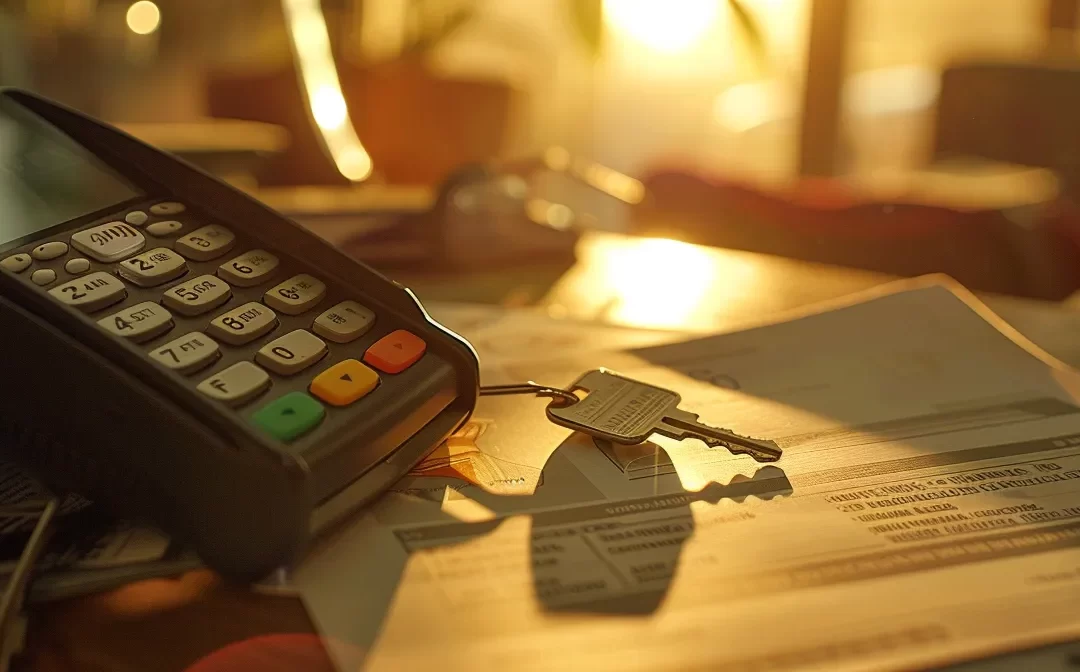Can you pay your mortgage with a credit card? This question often arises among homeowners seeking financial flexibility. This article explores the possibility of using credit cards for mortgage payments, examining both benefits and risks. We’ll cover how this approach can impact your credit history and debt-to-income ratio, discuss alternatives like Bilt Rewards, and touch on options during financial hardship such as forbearance. By the end, you’ll have the information needed to make an informed decision about this payment method.
Understanding the Option to Pay Your Mortgage With a Credit Card

Understanding credit card payments for mortgages involves assessing lender acceptance, exploring third-party services, and considering suitable credit cards. This approach can impact cash flow and budgeting. Homeowners should evaluate the potential benefits and risks of using credit for loan payments, weighing the dollar value against their financial goals.
Assess Whether Your Mortgage Lender Accepts Credit Card Payments
Assessing whether a mortgage lender accepts credit card payments is crucial for homeowners considering this option. Most lenders do not directly accept credit cards due to processing fees, but some third-party services like Plastiq offer alternatives. Homeowners should inquire about their lender‘s policies and explore options like Bilt, which allows mortgage payments through their credit card. It’s important to consider the annual percentage rate and grace period of the credit card, as well as any additional fees, to determine if this method is financially beneficial compared to traditional bank account payments.
Explore Third-Party Services That Facilitate Credit Card Transactions
Third-party services offer solutions for homeowners seeking to use credit cards for mortgage payments. Companies like Plastiq facilitate these transactions, allowing consumers to pay their mortgage with a credit card for a fee. While this option provides flexibility, it’s crucial to consider the potential impact on debt and interest rates. Homeowners should carefully evaluate the costs and benefits, keeping in mind their property obligations and the risk of late fees. The Consumer Financial Protection Bureau provides guidance on mortgage payments, which can help inform decisions about using credit cards for this purpose.
Consider the Types of Credit Cards Suitable for Mortgage Payments
When considering credit cards for mortgage payments, homeowners should compare rewards credit cards that offer significant benefits to offset any transaction fees. The ideal card should have a high credit limit to accommodate the substantial cost of mortgage payments, including property tax and home insurance. It’s crucial to evaluate the potential rewards against the card’s annual fee and interest rate, ensuring that the benefits outweigh the costs associated with using credit for these large transactions.
Benefits of Using a Credit Card for Mortgage Payments

Using a credit card for mortgage payments offers several potential benefits. Homeowners can earn rewards points, cash back, or travel miles, effectively reducing their housing expense. This method can help manage cash flow during financial shortfalls, providing a temporary buffer. Additionally, taking advantage of introductory 0% APR offers can temporarily defer interest on large payments, though careful planning is essential to avoid accumulating credit card debt.
Earning Rewards Points, Cash Back, or Travel Miles
Using a credit card for mortgage payments can provide substantial rewards, including cash back, travel miles, or credit card points. Homeowners may accumulate significant benefits due to the large amount typically associated with mortgage payments, potentially offsetting costs such as home inspections or other property-related expenses. However, it’s crucial to carefully evaluate the terms of the credit card and any associated fees to ensure the rewards outweigh the costs of using this payment method.
Managing Cash Flow During Financial Shortfalls
Using a credit card for mortgage payments can provide temporary relief during financial shortfalls, helping homeowners maintain their payment schedule and avoid potential foreclosure. This strategy allows individuals to manage their cash flow more effectively, especially when unexpected expenses arise or income fluctuates. However, homeowners should exercise caution and communicate with their mortgage servicer to ensure this method aligns with their loan terms and doesn’t trigger any fraud alerts. It’s crucial to consider the long-term implications on insurance rates and property valuation when using credit for mortgage payments.
Taking Advantage of Introductory 0% APR Offers
Homeowners can leverage introductory 0% APR offers on credit cards to manage their mortgage payments effectively. These promotions allow borrowers to make interest-free payments on their mortgage for a limited time, providing temporary relief from credit card interest charges. However, it’s crucial to plan for the end of the promotional period and consider the impact on escrow accounts when using a Mastercard or other credit card for mortgage payments.
Risks and Drawbacks to Consider

Using a credit card for mortgage payments carries significant risks. Homeowners may incur processing fees from third-party services, increase their credit utilization ratio, and face higher interest rates if balances aren’t paid in full. Additionally, this practice could potentially violate credit card terms and conditions. While credit card rewards may seem appealing, the potential for accumulating credit card debt outweighs the benefits for most borrowers.
Incurring Processing Fees From Third-Party Services
Third-party services that facilitate mortgage payments via credit cards often charge significant processing fees, typically ranging from 2% to 3% of the transaction amount. These fees can substantially increase the overall cost of the mortgage payment, potentially outweighing any rewards or benefits gained from using a credit card. Homeowners should carefully consider whether the additional expense justifies the convenience, especially when factoring in potential tax implications and the impact on their credit utilization ratio. Services like Bilt may offer more favorable terms for credit card mortgage payments, but users should still evaluate the total cost against traditional payment methods.
Increasing Your Credit Utilization Ratio and Impact on Credit Score
Using a credit card for mortgage payments can significantly increase a homeowner’s credit utilization ratio, potentially harming their credit score. This ratio, a key factor in credit scoring models, reflects the percentage of available credit being used. High utilization may signal financial stress to lenders, impacting future loan applications, including home equity loans or refinancing options. Homeowners should consider alternative payment methods, such as money orders, to maintain a healthy credit profile and preserve their real estate investment.
Facing Higher Interest Rates if Balances Are Not Paid in Full
Homeowners who use credit cards for mortgage payments face the risk of higher interest rates if they fail to pay off the balance in full each month. This can significantly increase the overall cost of the mortgage payment and potentially impact the homeowner’s credit score. The accumulating interest on unpaid balances may erode home equity over time, making it more challenging to finance future home improvements or access equity for other purposes. Carefully managing credit card payments is crucial to avoid these financial pitfalls and maintain a healthy financial profile.
Potential Violation of Credit Card Terms and Conditions
Using a credit card for mortgage payments may violate the card’s terms and conditions, potentially leading to account closure or legal issues. Some credit card issuers explicitly prohibit using their cards for mortgage payments or balance transfers related to home loans. This restriction aims to prevent cardholders from accumulating excessive debt or engaging in risky financial behavior. Homeowners considering this method should carefully review their credit card agreement and consult with their issuer to avoid unintended consequences that could impact their investment and future mortgage modification options.
Step-by-Step Guide to Paying Your Mortgage With a Credit Card

This guide outlines the process of using a credit card for mortgage payments, focusing on personal finance strategies. It covers selecting a suitable credit card, setting up a payment service, scheduling payments, monitoring transactions, and managing the credit card balance. Homeowners considering this approach should carefully evaluate their financial situation and consult with their mortgage lender before proceeding.
Choose a Credit Card With Favorable Terms and Rewards
Selecting a credit card with favorable terms and rewards is crucial for homeowners considering using it for mortgage payments. The ideal card should offer substantial cashback or rewards points to offset any transaction fees associated with mortgage payments. It’s important to choose a card with a high credit limit and a low annual percentage rate (APR) to minimize interest charges if the balance can’t be paid in full each month.
Set Up an Account With a Trusted Payment Service Provider
Setting up an account with a trusted payment service provider is essential for homeowners who want to use a credit card for mortgage payments. Reputable providers like Plastiq offer secure platforms that facilitate these transactions. Homeowners should research and compare different services, considering factors such as transaction fees, processing times, and integration with their mortgage lender‘s systems before creating an account.
Schedule Your Mortgage Payment Before the Due Date
Scheduling mortgage payments via credit card requires careful timing. Homeowners should initiate the transaction at least five business days before the due date to allow for processing time. This buffer ensures the payment reaches the mortgage servicer on time, avoiding late fees and potential negative impacts on credit scores. It’s crucial to consider the credit card‘s billing cycle when scheduling payments to maximize the interest-free grace period and manage cash flow effectively.
Monitor Transactions and Confirm Payment Receipt by Your Lender
After initiating a mortgage payment via credit card, homeowners should closely monitor their transactions and confirm receipt by their lender. This involves checking both the credit card statement and the mortgage account to ensure the payment was processed correctly and on time. Homeowners can contact their lender directly to verify the payment‘s receipt and proper application to their mortgage balance, preventing any potential late fees or credit reporting issues.
Plan to Pay Off Your Credit Card Balance to Avoid Interest
To avoid interest charges when using a credit card for mortgage payments, homeowners should plan to pay off their credit card balance in full each month. This strategy requires careful budgeting and cash flow management to ensure sufficient funds are available when the credit card bill is due. By paying the balance in full, homeowners can take advantage of the credit card‘s grace period and potentially earn rewards without incurring additional costs that could negate the benefits of using a credit card for mortgage payments.
Alternative Methods to Indirectly Use Credit Cards for Mortgage Payments

Homeowners seeking alternatives to direct credit card mortgage payments have several options. These include utilizing balance transfer checks, obtaining cash advances, and purchasing money orders with credit cards. Each method offers potential benefits but comes with unique considerations and risks that borrowers should carefully evaluate before proceeding.
Utilize Balance Transfer Checks Provided by Your Credit Card Issuer
Balance transfer checks provided by credit card issuers offer homeowners an indirect method to use credit for mortgage payments. These checks allow cardholders to transfer funds from their credit card account to their bank account, which can then be used to make mortgage payments. However, homeowners should carefully consider the balance transfer fees and promotional interest rates associated with these checks, as they can impact the overall cost of this payment method.
Obtain a Cash Advance With Caution Due to High Fees
Obtaining a cash advance from a credit card to pay a mortgage should be approached with extreme caution due to high fees and interest rates. Credit card companies typically charge a cash advance fee, often around 5% of the transaction amount, and apply a higher interest rate that begins accruing immediately. This method can significantly increase the cost of the mortgage payment and may lead to a cycle of debt if not managed carefully. Homeowners considering this option should thoroughly evaluate their financial situation and explore alternative payment methods before resorting to cash advances.
Purchase Money Orders Using a Credit Card Where Accepted
Purchasing money orders with a credit card presents an indirect method for making mortgage payments. While some retailers accept credit cards for money order purchases, this option often incurs additional fees and may be treated as a cash advance by credit card issuers. Homeowners considering this approach should carefully weigh the costs against potential benefits and verify that their mortgage servicer accepts money orders for payments.
Making an Informed Decision About Using Credit Cards for Mortgage Payments

Making an informed decision about using credit cards for mortgage payments requires careful consideration. Homeowners should evaluate their financial situation and ability to repay, consult with a financial advisor for personalized advice, and explore alternatives such as refinancing or loan modification. These steps help ensure a sound financial strategy that aligns with long-term homeownership goals.
Evaluate Your Financial Situation and Ability to Repay
Evaluating one’s financial situation and ability to repay is crucial when considering using a credit card for mortgage payments. Homeowners should assess their income stability, existing debt obligations, and monthly cash flow to determine if they can consistently pay off the credit card balance in full. This analysis helps prevent accumulating high-interest credit card debt that could jeopardize their home ownership. Consulting with a financial advisor or utilizing budgeting tools can provide valuable insights into the feasibility of this payment strategy.
Consult With a Financial Advisor for Personalized Advice
Consulting with a financial advisor provides homeowners with personalized guidance on using credit cards for mortgage payments. An advisor can analyze the individual’s financial situation, assess the risks and benefits, and recommend suitable strategies. They may offer insights into alternative payment methods or suggest refinancing options that better align with the homeowner’s long-term financial goals.
Explore Other Options Such as Refinancing or Loan Modification
Homeowners facing mortgage payment challenges should explore refinancing or loan modification options before resorting to credit card payments. Refinancing can potentially lower monthly payments by securing a more favorable interest rate or extending the loan term. Loan modification programs, offered by many lenders, may provide temporary or permanent changes to the loan terms to make payments more manageable. These alternatives often present less financial risk than using credit cards and can provide long-term stability for homeowners.
Conclusion
Using a credit card for mortgage payments offers potential benefits such as earning rewards and managing cash flow, but comes with significant risks including processing fees, increased credit utilization, and potential violation of credit card terms. Homeowners considering this option must carefully evaluate their financial situation, understand the associated costs, and explore alternative payment methods before proceeding. Consulting with financial advisors and thoroughly researching payment service providers are crucial steps in making an informed decision. Ultimately, while credit card payments for mortgages can provide temporary financial flexibility, traditional payment methods or options like refinancing often present more stable, long-term solutions for managing mortgage obligations.

